

Here comes the 2024 Jeep Grand Cherokee, ready to redefine the way you think about what an SUV can do. With equal inside-out value, making the most of every mile is just what this SUV does. More details are included below in our model overview of the new Jeep Grand Cherokee.
The 2024 Jeep Grand Cherokee at a Glance
Performance
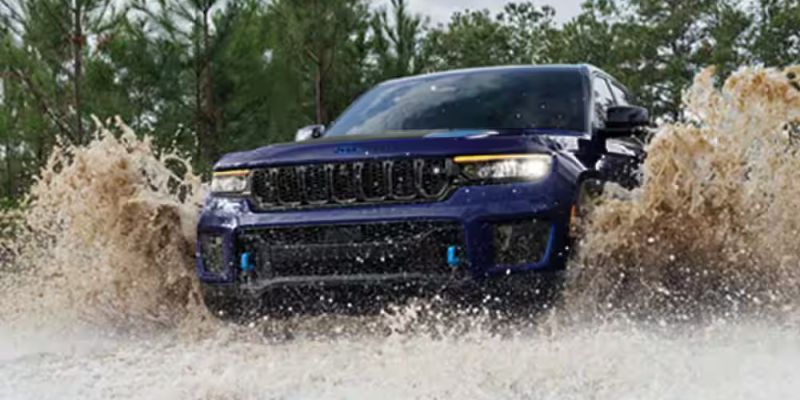
A new SUV should perform well wherever you’re going, whatever you’re doing, be it a camping trip, carpool, or commute. Features like the 3.6L V-6 engine particularly stand out, and Jeep engineering allows for an impressive 293 horsepower, and a towing capacity of up to 6200 lbs. That means the Grand Cherokee is an exceptional choice — even at the base trim level. Here’s a list with some more performance features available for this model:
- Electronic stability with anti-roll
- Cruise control with steering wheel controls
- ABS and Driveline Traction Control
Technology
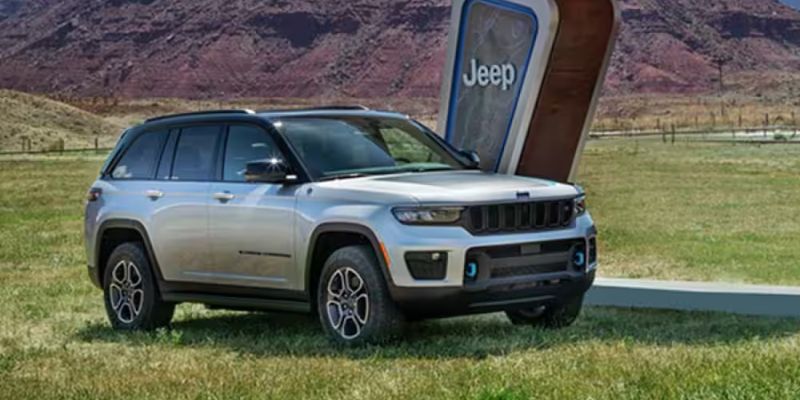
Nowadays, SUVs like the Grand Cherokee are available with technology designed to give you more information about your drive and the world around you — without being a distraction. The newest model is available with the latest safety innovations from Jeep, which will help you watch the road and cover your blind spots. While you focus on driving, a variety of multimedia options will keep everyone else content and entertained. For an even more comprehensive list of available technology features, read this list:
- Voice activated audio control
- Remote keyless entry
- Predictive Brake assist
Design
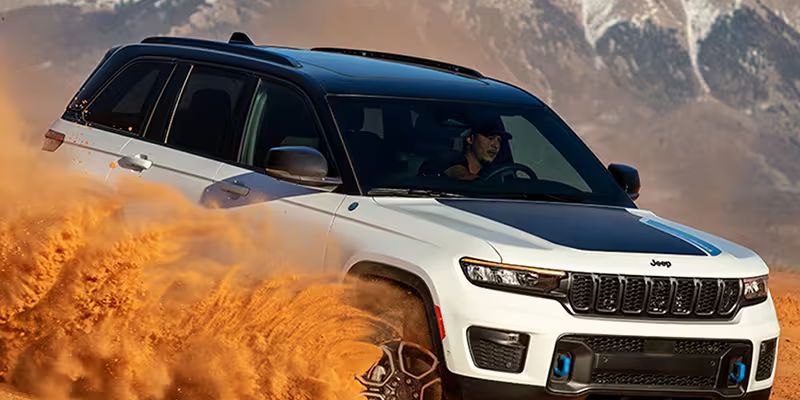
You want to drive a new SUV that looks the part, and the design of the Grand Cherokee conveys its strength and capacity. The Grand Cherokee offers spacious seating, and when you fold the seats down, it offers 71 cu ft of space for your haul. The point? Drivers won’t mind handing the keys over to ride shotgun in the Grand Cherokee. Follow up by looking into the rest of these available features:
- LED low/high headlight beam
- Built-in Air filter
- Driver and passenger heated mirrors
Experience a 2024 Jeep Grand Cherokee in LaGrange, GA
See the new Grand Cherokee for yourself at Mike Patton Chrysler Dodge Jeep Ram. Choose from any of the new Jeep cars for sale in our inventory for the kind of deal you won’t find anywhere else in LaGrange, GA. You might also find a chance to save when you look at our new Jeep specials, so check those out and schedule a test drive.
*MSRP: Starting price represents the manufacturer’s suggested retail price (MSRP) for the trim. The MSRP does not include destination and handling charges, taxes, title, license, options, and dealer charges. Actual prices are set by the dealer and may vary. Photo is for marketing and example purposes only. Photo may not reflect starting MSRP or trim level.\n**EPA-estimated MPG for City/Highway for 2024 Jeep Grand Cherokee . Actual mileage will vary. Displayed MPG is based on applicable EPA mileage ratings. Use for comparison purposes only. Your actual mileage will vary, depending on how you drive and maintain your vehicle, driving conditions, battery pack age/condition (hybrid models only) and other factors.
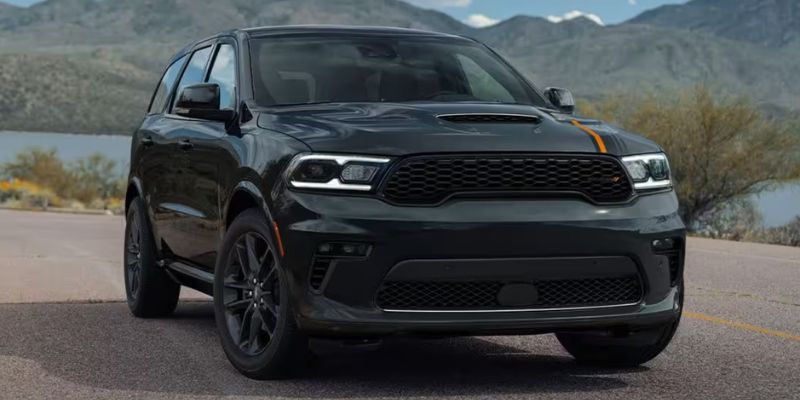

You’ll find that nearly every nameplate offers a CUV, but only Dodge can bring it to you in its fully-realized state: the 2023 Dodge Durango. The curb appeal of this CUV is only surpassed by its drivability and passenger experience. Get all the key details on the Dodge Durango in this model overview.
Meet the 2023 Dodge Durango
Performance
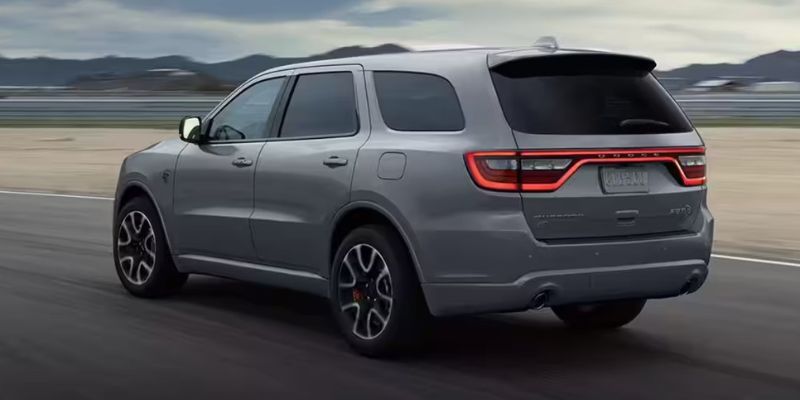
CUV shoppers shouldn’t have to choose between horsepower and fuel economy, and in the new Durango, they don’t. There’s a lot to admire about the Durango, but perhaps nothing more than the estimated Fuel economy up to 19 city/ 26 highway**. As balanced as they come, this powertrain alone justifies the CUV craze. Below are a few more available performance features of this CUV:
- Available 6.2L HEMI® V8
- 3.6L PENTASTAR® V6
- Available all-wheel drive
Technology
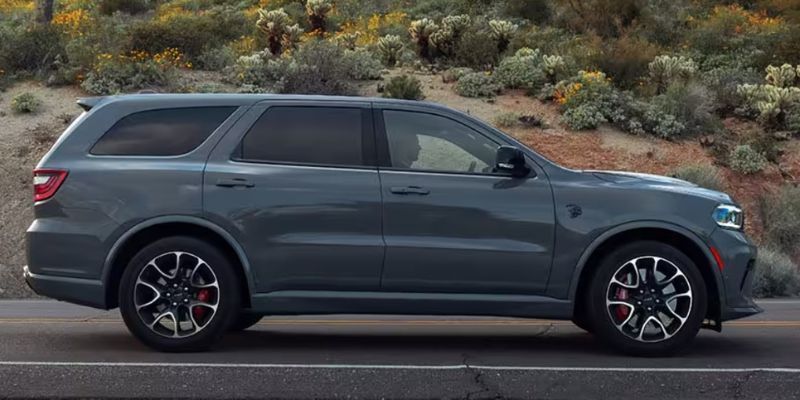
Technology in a CUV helps owners in many ways, and chief among them in the Durango is safety. Options for additional safety features help you monitor the road, navigate tight parking lots, and protect passengers. In addition to a smarter and more stable ride, the Durango also standardizes other digital aspects: first-rate navigation and infotainment. For an even more comprehensive list of available technology features, read this list:
- Rear Cross Path Detection
- Available 10.1-inch touchscreen display
- Available Uconnect® Voice Command
Design
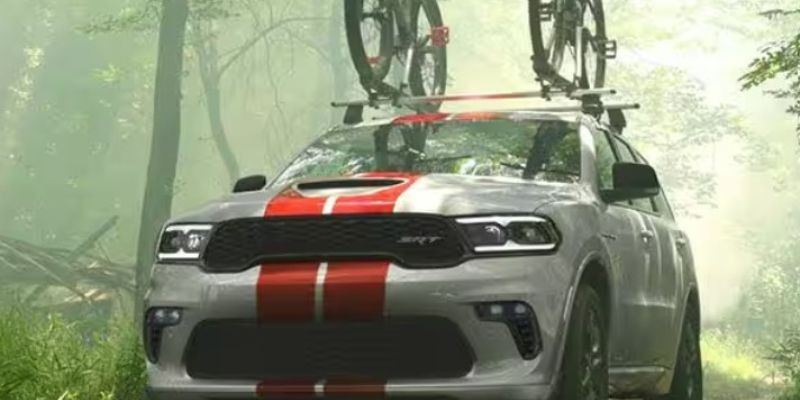
A new CUV should look as capable as it is, and the bold design of the 2023 Durango lends itself perfectly to that. There’s only one word for the 85 cu ft of the Durango: capacious. This spaciousness is only bested by premium in-cabin seating arrangements. For an even more comprehensive list of available design features, read this list:
- LED Low-Beam headlamps
- Daytime running lamps
- Available integrated wireless charging pad
Experience a 2023 Dodge Durango in LaGrange, GA
See the new Durango for yourself at Mike Patton Chrysler Dodge Jeep Ram. Our salespeople are excited to show you the new Dodge and all the other options in our portfolio of new Dodge cars for sale in LaGrange, GA. And if you need another reason to pay us a visit, our new Dodge specials should seal the deal.
*MSRP: Starting price represents the manufacturer’s suggested retail price (MSRP) for the trim. The MSRP does not include destination and handling charges, taxes, title, license, options, and dealer charges. Actual prices are set by the dealer and may vary. Photo is for marketing and example purposes only. Photo may not reflect starting MSRP or trim level.\n**EPA-estimated MPG for City/Highway for 2023 Dodge Durango . Actual mileage will vary. Displayed MPG is based on applicable EPA mileage ratings. Use for comparison purposes only. Your actual mileage will vary, depending on how you drive and maintain your vehicle, driving conditions, battery pack age/condition (hybrid models only) and other factors.
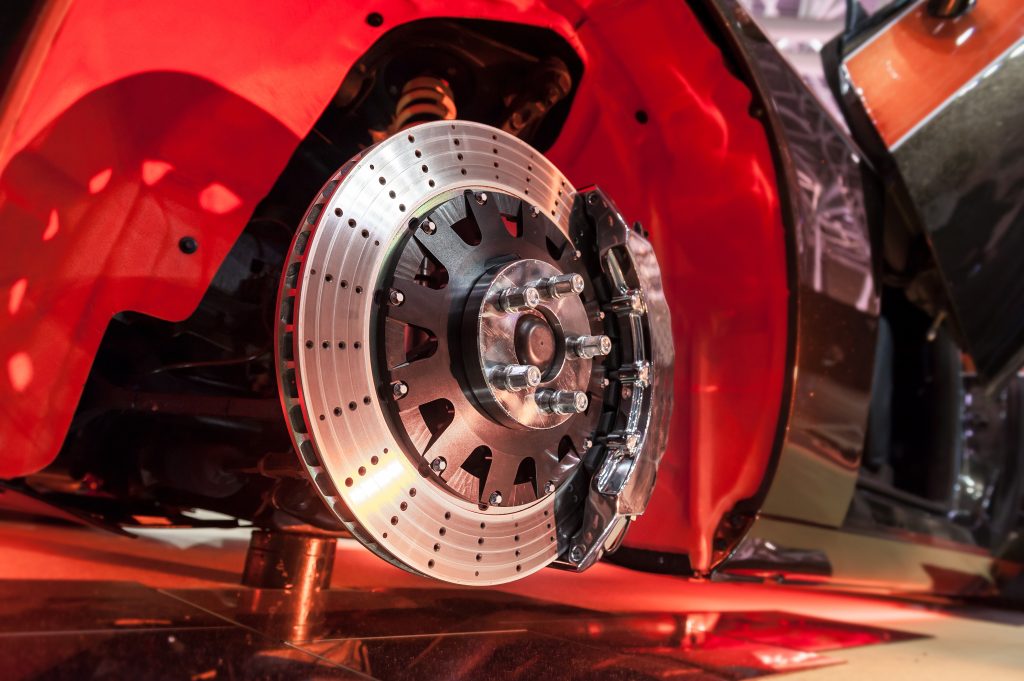
The brake is an essential component of every automobile. It is an electronic device that’s responsible for the slowing or stopping of a moving vehicle. Every car’s wheel is equipped with two brake systems. However, highly- advanced modern cars are equipped with an extra two-brake system, making it four altogether. This article explains everything you need to know about your car’s braking system. It also explains what you should do when this braking system fails.
The Brake Systems
Here is a breakdown of the four brake systems commonly found in advanced cars;
- Disc Brakes: The disc brake system is commonly found at the front of modern cars. It consists of a brake rotor which is attached straight to the wheel.
- Drum Brakes: Drum brakes were used in older cars and were fixed near the car’s four wheels. This brake system is attached to the wheel’s insides and is located at the car’s rear axle.
- Emergency Brakes: Emergency brakes work independently and are found in highly-advanced modern cars. They are used in emergencies and to keep a vehicle static while parked. Emergency brakes come in different forms. It could be a push button, a stick lever between a passenger and a driver, e.t.c.
- Autonomous Braking System(ABS): This braking system is found in new, advanced cars. It automatically applies the brake if it detects any obstacle(vehicle/pedestrian).
Causes of Car Brake Failure
Weak car brake pads are a significant cause of car brake failure. However, there are other common causes of brake system failure. They include:
Overheating Brake Pads
Aggressive braking and driving can cause your brake to overheat. This makes your brake pads hard and decreases the effectiveness of the wheel rotor disc. Apart from this, a wrongly installed brake pad can also be a reason for brake overheating.
Car Owner Carelessness
This is a common cause of brake malfunction. Many brands always guarantee brake durability. However, this is limited to a standard driving pattern. That is, the lifespan of every brake depends on the owner’s usage. Therefore, drivers need to be aware of this and remember to constantly inspect the brakes.
Hydraulic Fluid Leakage
The leading causes of hydraulic leakage are seal failure, temperature problems, installation errors, hose failure, and pressure problems. If you detect difficulty while stopping your car, you should inspect it immediately for any chance of a hydraulic leak.
Driving in Wet or Muddy Areas
Driving through mud or wet areas would hinder the effectiveness of your rotor discs or brake pad. If you pass through a wet area, gently tap on the brake to remove the stored-up water. This would reduce friction between the brake pad and the rotor discs.
Loss of Hydraulic Brake Fluid Pressure
Loss of hydraulic brake fluid pressure would cause difficulty in stopping your car. If pressure loss occurs, pump the brake pedals continuously to build up pressure again. However, this technique should only be used when needed. Otherwise, it could cause more problems for the brake pedals.
Vehicle Overloading and Damaged Rotor Discs
Overloading your vehicle could affect the potency of your car brakes. They could damage the rotor discs, which in turn, decreases the lifespan of your brake pads.
Signs of a Car Brake Failure
It would help if you observed the various signs your car gives and further inspected it, especially when it comes to car brakes. Doing this will help prevent its total shutdown and avert accidents. Below are some signs of a bad brake;
Offensive Odor from the Brakes
If you detect a burning smell coming from the brake of your car, it’s a sign you have to check your car brakes. The offensive odor could result from burnt components within the brake pads. And not only is this harmful to health, but it causes unwanted friction between the brake pads.
Shrieking Noises
Shrieking and howling noises are signs that the brake pads have been enormously damaged. And the car needs brake pads replacement. Failure to replace them could cause other brake components to malfunction.
Brake Warning Lights
It’s strongly advisable to drive with your car brake warning light on. The reason is it would signal to you if there is a brake failure. If your brake light comes on but your brake fluid levels are normal, keep driving to a repair shop for further inspection.
Shuddering Brake Pedal
If you notice your braking pedal or steering wheel vibrating as you drive, it’s a sign that you must check out your car’s rotor discs. Also, oil, dirt, or other contaminated substance in the car brake could cause your brake pedal to vibrate. Therefore, it would be best to make a habit of cleaning your brakes frequently.
Brake fluid leakage and brake fading
If you notice a leak in the fluid system, it’s a sign that your car brakes might have issues. Another sign is overheating, which could cause a sudden brake fading as you drive.
What To Do When My Car Brake Fails When Driving?
Experiencing a car brake failure can be pretty dangerous. However, when such happens, do these things to prevent accidents or worse scenarios;
Try Not To Panic
Although it might not be easy, try hard not to panic. Panicking could lead you to make a wrong move and worsen the situation. You must be calm, clear your head, and work toward a solution.
Turn On The Hazard Lights
After getting control of yourself, turn on your car’s hazard lights. The hazard light serves as a safety function. And would send a message to other drivers to avoid your car. You can also continuously honk while trying to get to safety.
Continuously Pump The Brake Pedal
If your car brakes are not working, try pumping the pedal at a faster rate. In highly advanced cars, the ABS can help pump the brake faster than the driver. However, if your vehicle doesn’t have the ABS, you must pump both braking systems (disc/drum) on your own. If one responds, you could quickly drive to a parking space.
Utilize The Parking/Hand Brake
Apart from the disc and drum brakes, there is another brake called the parking brakes. It helps you park your car in case of a car brake problem. However, it would help if you used it at slow speeds. This is because increasing the speed could cause your vehicle to spin, resulting in a fatal accident.
Don’t Shut Down The Engine Before Stopping
Ensure that you don’t shut down the engine before stopping your car. Doing this would cause a loss in the engine braking and power steering. It could also cause a lock in the steering wheel.
Leave The Road And Call For Assistance
After parking the car, leave the road safely. However, keep your car hazard light before you alight from the vehicle. Then call for assistance or tow away for repairs.
Conclusion
If you detect any of the signs mentioned, you should inspect your brake and take proper action. If you encounter a sudden brake failure while driving, follow the steps explained above and get to safety. If you need a car brake service, visit us at Acura of Tempe. Our expert and highly-experienced mechanics will ensure your car is fit again for the road.
10 Signs Your Car Needs Service
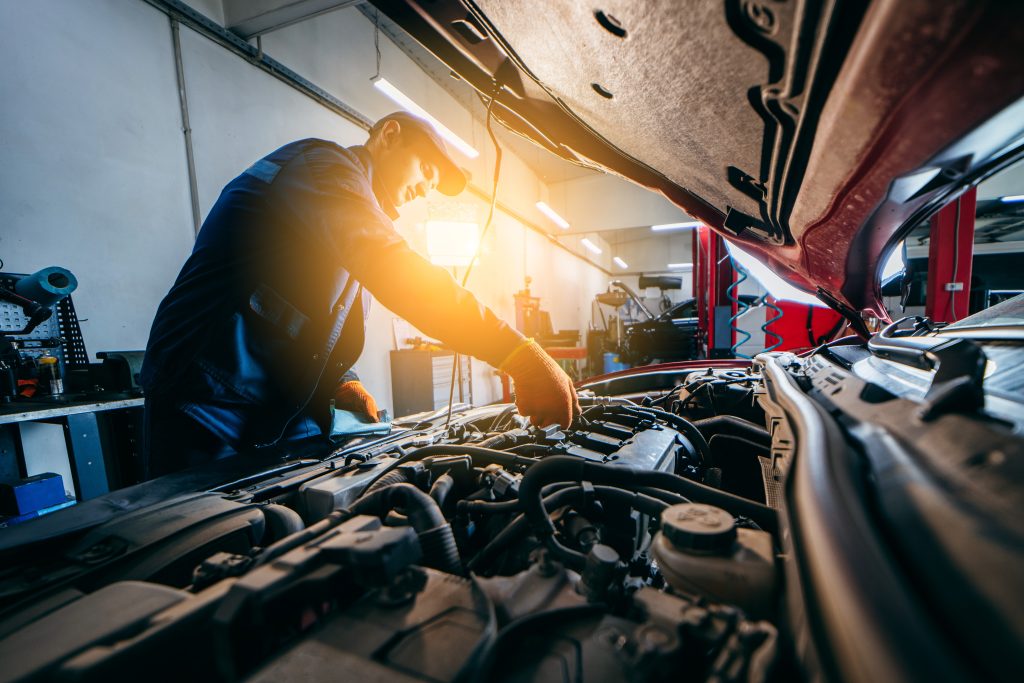
In many ways, life has its means of creeping up on us with unwelcome news when they are least expected. This case also applies strongly to cars. Car servicing involves several maintenance operations at a predetermined time interval or after your car has traveled a specific distance.
These days, it is imperative to have a perfectly running, healthy vehicle for your job or even a regular commute. It would be a highly unfortunate incident if your vehicle breaks down unexpectedly, and you are then required to pay high fees for its car repair. This article explains all the signs that show your vehicle needs servicing, so you can avoid such surprises.
10 Signs Your Car Needs Service
To avoid a sudden car breakdown, you must be highly observant. This will hw]elp you answer the question “when should I service my car”. The following are signs that indicate your car needs a service:
- Lights on the dashboard
- Braking problems
- Ignition problems
- Strange noises
- Grinding gears
- Power reduction
- Excessive smoke
- Weird vibrations
- Stalling
- The user manual indications
Lights on the Dashboard
Dashboard lights are usually the most blatant physical sign that your car needs a service. Cars made from the early nineties till now all come with dashboard lights designed to give you a heads up of whatever issue your car is facing. Disregarding these warning lights can be detrimental as they can land you in trouble.
Of all the dashboard warning lights, the Check Engine light and the service light can be termed the most important. This is because they are initiated by various issues related to the engine.
Braking Problems
Over the years, cars have evolved and so have their braking systems. And these technologies are still advancing by the day. Therefore, with the comfort of having a wide array of systems ensuring our protection, you might forget to check up on your braking systems most times.
Poor braking feedback, braking resistance, and braking over sensitivity are apparent signs that your car needs a service. If your car responds unusually when braking, the problem could be suspension issues, worn discs or pads, or even a steering problem. Since these parts tend to wear out after some time, they can be very dangerous to you.
Ignition Problems
Starting your car should go without any hitch. However, if you hear some splutter, coughs, engine struggle, or whirring sounds, something is up with your car’s engine. These noises are usually caused by a worn or loose cambelt, which requires service.
Even if there are no noises, but you’re having ignition problems like endlessly turning the keys, you need to take your car for a car inspection. The reason is this problem could be caused by various issues that need to be resolved before they worsen and require more fees for resolution.
Strange Noises
While driving on the road, if you hear high-pitched noises, that is either an indication that your power steering fluid is getting too old and contaminated. It could also be that your tires are unbalanced or overly worn.
Uneven noises also come from the engines when there is an issue with the air-fuel mix. These noises can lead to Ignition problems as well. However, when you rectify them early enough, you are indirectly averting a more significant car problem.
Grinding Gears
For almost everyone, the sound of grinding and gnashing gears is uncomfortable. And it’s not just the grinding sound alone. If you notice difficulty in changing gear, there could be a problem. The reason for this problem is that the friction between gears will leave the transmission needing attention after some time. But tending to this problem quickly helps avoid more significant expenses.
Power Reduction
A power reduction can occur due to several factors. When you notice your vehicle’s performance has gotten slightly worse than how it used to be, then it is advisable to get your car checked.
Problems like unexpected power surges, difficulty in getting speed, and a reduction in your car’s mpg are examples of reduction in power and performance. And sometimes the reason might be that your car is aging. However, it mostly happens because of minor issues that you can quickly resolve.
Excessive Smoke
On colder days, It is normal to see slightly more white smoke at your engine’s first startup due to the exhaust system’s water vapor. This effect should decline as temperature increases. However, when you begin to see clouds of smoke or your car leaves a dark cloud of smoke in the rear, there is an issue.
Smoke can arise from an overheating engine. Additionally, heavy smoke can be caused by oil blockage or an accumulation of contaminants in your oil system. These can severely damage the engine if left unresolved. It would be best to prioritize getting that car service when you notice this.
Weird Vibrations
Your car can begin to vibrate or judder even when you are not on a poor road surface. The juddering can be caused by a pressure plate defect or worn-out friction material. It could even be a combination of both. Also, when an oil leak contaminates your clutch plate, juddering can occur.
If you experience a vibration at low revs, it could be that the mount that holds the engine in place is broken, loose, or worn. Unbalanced tires and loose bearings can also lead to vibrations and juddering. And all these mean you need to service your car.
Stalling
Stalls usually occur when debris and dirt block the fuel filters. They can also arise due to spark plug issues. Most times, when stalls occur when you are in the right gear, the culprits are the spark plugs and oil filters. You need not blame yourself, but take your car to a repair shop for servicing.
The User Manual Indications
Your user manual is an instructional booklet that gives you a proactive method of maintenance and upkeep of your car. It helps give you a suitable care plan to follow to prevent more significant issues from developing.
Within the manual, you will find the meanings of various symbols, what to do if you find a particular issue with your car, and many other things. Your user manual guides you and helps you know when to service your car.
Conclusion
Servicing your car regularly is vital to avoiding worse troubles. And it’s even more important if you notice these signs before the usual service interval. For your car servicing, you can contact us at Mike Patton Auto. We have well-experienced technicians that will provide your chrysler, dodge, jeep, or ram a good car service. You can also look through our inventory of parts and cars while you’re there.
A certified pre-owned vehicle is a used vehicle that has been inspected by factory-trained mechanics. It is certified by the manufacturer, and comes with a manufacturer-backed warranty. That is, you don’t have to panic about being scammed or the car’s mechanical condition. And, no more worries about going bankrupt due to unexpected car maintenance and repairs because there is an assured backed warranty.
Certified pre-owned (CPO) vehicles are derived from different sources. When a leased vehicle is returned, or a dealer trades or buys a car at auction, the car is redirected as a CPO prospect. The dealer will inspect the mechanical condition, the miles it’s driven, the time of vehicle purchase, and its history. If it’s in an acceptable condition, they will put it through a reconditioning program and then put it up for sale in the CPO program.
Key Features of a CPO Program
Almost all car models have a CPO program with different features. However, the notable ones are;
Authorized Dealers
Buying a CPO is like buying a new vehicle. This is because only authorized dealers sell CPO vehicles and their brand models. For example, Jeep dealers sell only jeeps, Ram dealers sell only Ram, Dodge dealers sell only dodge, Acura dealers sell only Acura and e.t.c.
So, you don’t have to worry as it is very different from second-hand car dealers where you have little or no information about their vehicles.
Current Vehicle Choices
Many CPO vehicles have fewer than 50,000 original miles of drive and are just several years old or less than that. In most cases, a CPO vehicle younger than three years old will be the same generation as those new vehicles currently on sale. This is because most vehicle makers keep their vehicles in production for at least six years.
Factory Backed Warranties
Another interesting thing about CPO vehicles is that they usually have double warranties. The limited powertrain warranty covers the transmission, engine, and other important, expensive mechanical parts. The other one, the limited bumper-to-bumper warranty, covers issues like the infotainment and air-conditioning system. The powertrain warranty is for thousand miles and multiple years, while the bumper-to-bumper warranty is for a shorter period.
Although, every model CPO program differs in various details. Some CPO warranties begin with the vehicle’s original purchase date, while others begin when the factory warranty ends.
Offers Top Quality Vehicles
All CPO vehicles undergo thorough inspection with factory-trained technicians going through all the maintenance parts. Imagine riding in a used vehicle with more comfort and less worry.
Some Other Special Features
As earlier stated, all CPO programs differ. Some offer special deals on satellite radio subscriptions. And other offers come with a complimentary maintenance schedule. Depending on your CPO model, you could get offers like: free roadside assistance when you have a flat tire, maintenance problem, or run out of gas.
Advantages of Buying a Certified Pre-Owned Vehicle
Certified pre-owned vehicles have many advantages. Some of them are;
CPO Vehicles Cost Less when Compared to Some Other New Model Vehicles
A CPO vehicle will cost less than another new vehicle model of the same levels and features. Due to the vehicle depreciation rate after some years, its cost will reduce. Some three-year-old vehicles quickly lose 30 percent of their value.
CPO Vehicles Enjoy Limited Warranties
Buying a CPO vehicle puts you at a shallow risk of making the wrong purchase. This is because besides undergoing a thorough inspection, they still enjoy limited warranties on their major mechanical parts and convenience system.
Road Insurance
Just like any other vehicle, a CPO vehicle can still let you down. That’s why many CPO programs offer trip interruption reimbursement. For example, Jeep, Ram, and Dodge offer up to $1000 trip insurance if your vehicle breaks down more than 100 miles from home. This $1000 covers the meals and lodging expenses.
New, Low Mileage Vehicles
To be certified, many CPO vehicles must be within certain age limits and mileage. Some may be less than six years with about 70,000 miles, while others are lesser. These days, vehicles are leased after two- to- three years. Hence it’s easy to find new, low-mileage models in the market.
Disadvantages of Certified Pre-Owned Vehicles
There are very few disadvantages attached to a certified preowned car. They include;
CPO Program Vary Widely
Going through a CPO program can be very tiresome. This is because there is no such thing as a standard CPO program. There are only significant components which you must go through well before arriving at a decision. For example, some vehicles come with manufacturer backed and dealership warranties.
CPO Vehicles Cost More when Compared to New Vehicles of the Same Model
In some cases, the CPO vehicle of a model can be less expensive when compared to another new model vehicle. However, a CPO vehicle can cost a few thousand or hundred dollars more than a new vehicle of the same model. This is because there is an agreement to guarantee any breakdown or maintenance repair of a CPO vehicle. Apart from that, the CPO vehicle goes through a thorough reconditioning process.
Less Choices
Finally, there may not be many automobiles available. This is due to the fact that only a small number of used cars are accepted into the CPO program after passing many examinations, meeting low-mileage standards, and being reconditioned. Finding the ideal automobile might be difficult. Additionally, you might need to be flexible in your choice.
Conclusion
Buying a certified pre-owned vehicle is worth it. However, before purchase, you must weigh the benefits the dealership offers. We sell certified pre-owned Jeeps, Rams, and Dodge at Mike Patton Auto Group. Our CPO vehicles include a manufacturer-backed warranty and undergo a series of inspections and reconstruction processes. Visit our website today for more information.
10 Things You Shouldn’t Do To Retain Your Car Value
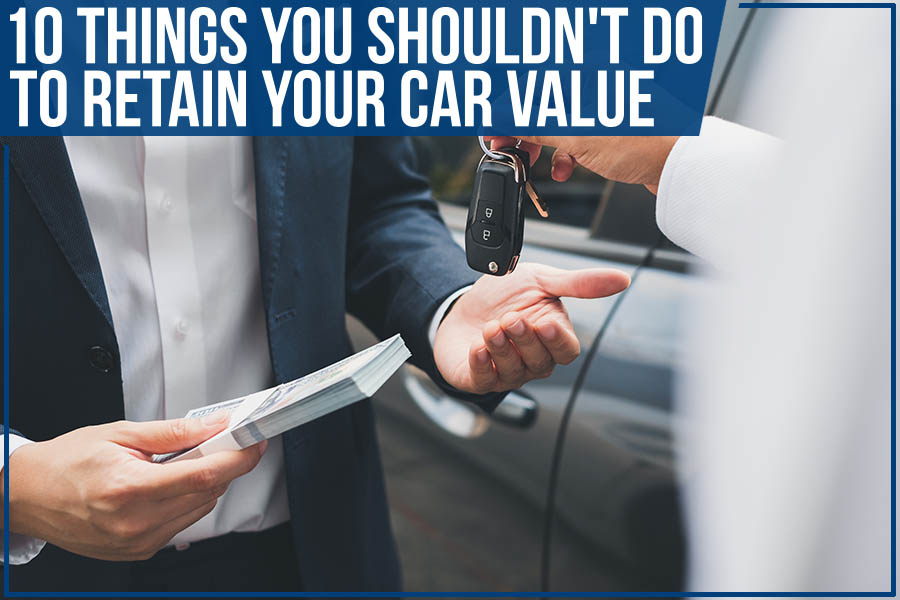
Key Takeaways:
- If you’re a smoker, it’s best to avoid smoking inside your car.
- Maintaining your car also means driving it responsibly. That means no speeding, tailgating, or making sudden stops and starts.
- Maintaining the pain of your car is essential as it’s one of the first things potential buyers will notice.
- If you plan to sell your car, it is essential to use stock parts. It’s because aftermarket parts can devalue your vehicle.
- Car dealerships have trained technicians who know how to service your car correctly. This will save you from potential problems down the road.
When you purchase a car, one of the most significant considerations is how much that car will be worth down the road. You’d want to make sure you’re doing everything you can to retain your car’s value so that when it comes the time to resell, you get as much money for it as possible.
You can do a number of things to maintain your car’s resale value. You can keep it clean and well-maintained, avoid driving it aggressively, and ensure all the necessary repairs are done on time.
However, there are also some things you shouldn’t do if you want to maximize your car’s value. Let’s discuss these to give you a better idea.
Everything You Shouldn’t Do to Maximize Your Car’s Resale Value
1. Smoking Inside Your Car.
If you’re a smoker, it’s best to avoid smoking inside your car. The smell of cigarettes can be complicated to eliminate and can turn off potential buyers.
Additionally, the nicotine in cigarettes can cause the yellowing of surfaces inside the car, like the upholstery, windows, and ceiling. If you must smoke in your car, open the windows to air it out afterward.
2. Neglecting Regular Maintenance.
Never neglect regular maintenance. Important maintenance tasks include oil changes, tune-ups, and tire rotations.
Not only will neglecting regular maintenance reduce your car’s value, but it can also lead to more significant issues. For instance, if you don’t regularly change your car’s oil, it can cause engine damage.
3. Driving Your Car Aggressively.
Maintaining a high resale value for your car also means driving it responsibly. That means no speeding, tailgating, or making sudden stops and starts.
Not only is this safer for you and other drivers on the road, but it’s also safer for your car. Sudden stops and starts can be detrimental to your car’s brakes, while aggressive driving can reduce the lifespan of your tires.
4. Not Maintaining Records of Service and Repairs.
If you’re planning to sell your car or trade it in at a dealership, you’ll need records of all the services and repairs that have been done on the vehicle.
These records show potential buyers that you’ve been taking good care of the car. The dealership can also use them to give you a more accurate estimate of your car’s value.
5. Failing To Clean Your Car Regularly.
A clean car is worth more money and is more pleasant to drive. If you plan to sell your vehicle or trade it in, it’s best that you give it a thorough cleaning inside and out.
It includes cleaning the carpets, wiping down all the surfaces, and polishing the exterior. You may even want to have the car professionally detailed to get the best possible results.
Are you noticing any scratches on your car’s body? Here are some easy fixes.
6. Not Fixing Minor Problems.
If you notice a minor problem with your car, it’s tempting to ignore it and hope it will go away. Unfortunately, this is rarely the case.
Ignoring minor problems can lead to major (and expensive) repairs in the future. If you can take care of issues as soon as they appear, you’ll be saving money and more likely to get top dollar for your car when it’s time to sell.
7. Not Using Paint Protection Products.
Maintaining the pain of your car is essential as it’s one of the first things potential buyers will notice.
Investing in paint protection products is a great way to keep your car looking its best. These products can help prevent fading, chipping, and scratching. They can also make washing and waxing your vehicle easier.
Ignoring paint protection will not only make your car less valuable, but it can also be dangerous. For instance, if your car’s paint is faded, it may be more challenging to see in low-light conditions.
8. Not Getting Regular Oil Changes.
Regular oil changes are crucial for maintaining the health of your engine. Over time, oil breaks down and becomes less effective at lubricating and cooling your engine. It leads to wear and tear, which damages your engine.
Skipping oil changes will also lower your car’s resale value, as potential buyers will be concerned about the engine’s condition. Keep records of all oil changes, as this will show potential buyers that you have taken reasonable care of the car.
9. Not Cleaning the Headlights.
Headlights can become cloudy and yellowed over time, significantly reducing light output. This can be a safety hazard, making it more challenging to see the road ahead in low-light conditions.
Timely cleaning of the headlights will help maintain their original condition and clarity. It will also make your car appear more presentable and increase your car’s resale value.
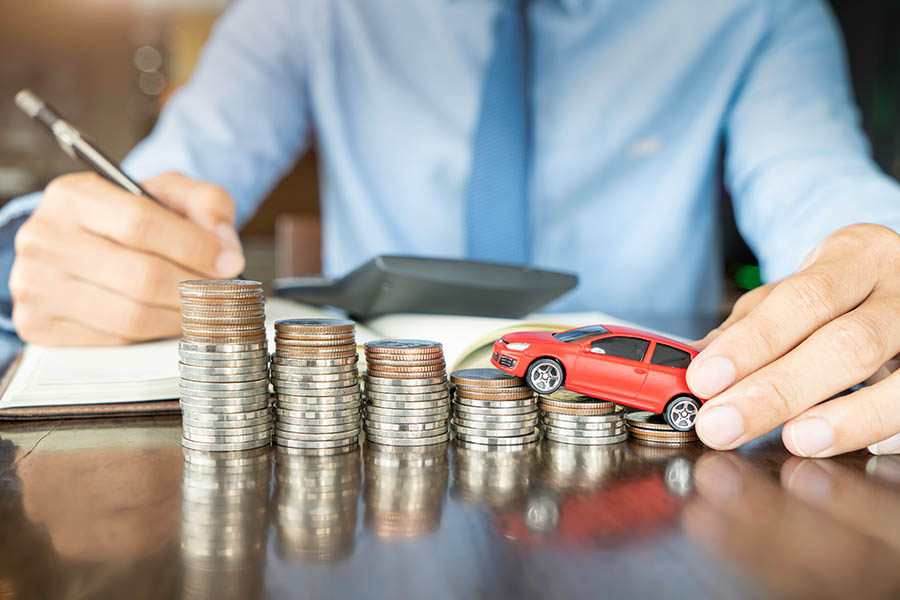
10. Not Using Stock Parts.
If you plan to sell your car, it is essential to use stock parts. It’s because aftermarket parts can devalue your car. Potential buyers may be put off because your vehicle has been modified, leading to a lower resale value.
It’s worth noting that certain insurance companies may refuse to cover car-modified aftermarket parts. It could cause potential problems down the road if you ever need to make a claim.
So, if you want to maintain your car’s resale value, it is best to stick with stock parts.
Reasons To Get Your Car Maintained by An Authentic Car Dealership?
Maintaining your car’s value is essential if you ever plan on selling it. One way to do so is to bring your car to an authentic car dealership for all its maintenance needs.
An authentic car dealership will always use genuine parts. It’s vital because aftermarket parts can devalue your car’s resale value. Potential buyers may be put off because your vehicle has been modified, which can lead to a lower resale value.
They have trained technicians who know how to service your car correctly. It’s essential because improper servicing can lead to problems down the road that could affect your car’s value.
Moreover, potential buyers will want to see a history of the car’s maintenance, and dealerships will keep documents of all the maintenance work done on your vehicle.
Taking some precautionary measures to maintain your car’s value will ensure you get the most money back when it comes time to sell.
Mike Patton CDJR offers extensive inventories of pre-owned and new vehicles in Greenville, GA, to meet your various automobile needs. Besides that, we also provide car servicing and financing options.
6 Car Sounds You Should Never Ignore
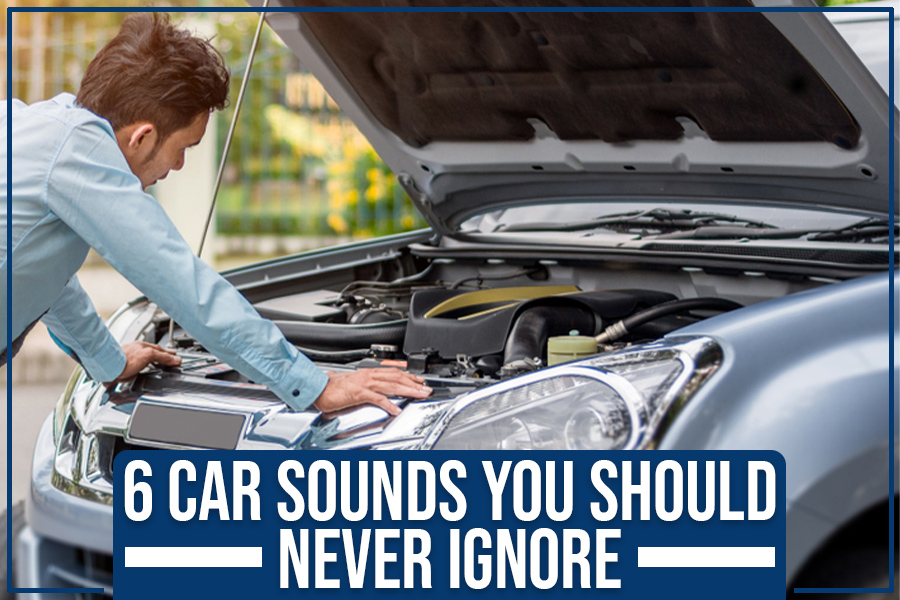
Key Takeaways:
- Car sounds can be an indicator of a serious problem
- If you hear any strange car noise, it’s important to get it checked out as soon as possible
- Some of the car sounds and noises you should never ignore are grinding or squealing when you brake, a rattling engine, a hissing sound, a clicking noise when you turn the steering wheel, and more.
- Trust Mike Patton service center, and we can identify and solve the sound problem of your car.
Car sounds and noise can be indicative of a problem with your car. It’s important to know what to listen for and, more importantly, what you should never ignore. In this blog post, experts at Mike Patton CDJR will go over the most common car sounds and noises to which you should pay attention. By knowing what these sounds mean, you can save time and money by addressing the issue before it becomes a bigger problem.
01: Chirping or Squealing Sound from a Wheel While Driving
A failed wheel bearing or axle bearing is sometimes indicated by a cyclical chirping or squealing sound emanating from the wheel(s) region. This kind of noise often changes with the car’s speed and may appear and disappear at different speeds. It’s important to pay attention to this noise since ignoring it might result in the wheel locking up or even coming off your automobile if the bearing breaks.
Don’t confuse wheel bearing noise with possible braking noises such as scraping, groaning, or creaking. Moisture causes the brake pads to bulge gradually in wet conditions. As a result, the pads could drag and make uncomfortable groans or creaks when drying out and heating up.
02: Clicking Sound During A Turn
One of the most dangerous car sounds is a clicking noise when making a turn. There are two potential causes for this: a damaged CV joint or an issue with your power steering system.
If you hear clicking when making turns, getting your car checked out as soon as possible is important since this could lead to losing control.

03: Scraping or Grinding Noise When Braking
When the brake pads are moist, brakes occasionally moan or creak, and some brake pad types—particularly semi-metallic pads—may scream or squeak when they are cold. However, when the brakes are applied, they should generally be quiet.
If you hear metallic scraping or grinding noises when you brake, your brake pads are worn out. Replace your brakes right away since old ones might not be able to stop your car at a safe distance. If the brakes are so worn down, there is a chance that the remaining friction material on the pads might detach from the supporting plate, perhaps resulting in the brakes failing. The rotors suffer a great deal of harm from metal-to-metal contact.
04: Hissing Sound from The Engine
While driving or after shutting off the engine, if you continuously hear a hissing sound coming from the engine compartment, your engine may be overheating, or the cooling system may leak coolant. Check the temperature gauge or warning light to determine whether an overheating condition is present. If you observe steam, stop driving immediately since extreme overheating might harm your engine.
Stop your automobile, then cautiously raise the hood. Check the engine, radiator, and heater hoses for any signs of coolant leakage. The cooling system loses coolant if you see steam or a pleasant odor.
Do not open the radiator or remove the coolant reservoir caps before the engine completely cools down and wait a while before adding coolant.
05: Clicking or Tapping Noise from Engine
While engines can make various noises, a metallic tapping or clicking sound could indicate that your engine is running short on oil or not producing proper oil pressure. The valvetrain is where you may hear the clicking. The hydraulic lifters that open and close the valves may collide if oil pressure is low, either due to a low oil level in the crankcase or an issue with the oil pump, increasing valve lash. This sound is what you’re hearing, coming from the engine’s top near the valve covers.
Check the oil level on the dipstick or tester after stopping the engine and letting it sit for a while (to allow the oil to flow back down into the crankcase). If the level is low, add oil as necessary to restore it to the full mark. Avoid adding too much oil to the crankcase. In addition, look for oil leaks in the engine. Engine oil can escape due to the worn valve cover and pan gaskets, leaking crankshaft end seals, and other factors.
Driving your car is not recommended if the noise persists or the oil pressure gauge or warning light shows low oil pressure. Oil pressure loss may harm an engine severely and cost money.
Additional engine noises may also mean bad news. Wearing connecting rod bearings can produce a deep metallic rapping sound, which may signify that your engine is about to fail.
06: Roaring from The Exhaust
When you accelerate, the exhaust noise from under your car will be the loudest if your exhaust system leaks. Although the noise won’t hurt you, it does indicate that your exhaust system needs to be repaired (probably a new muffler or pipes). The risk arises if the carbon monoxide-containing exhaust gases, which are leaking, enter the passenger area.
You should get your exhaust system fixed as soon as possible. Gaskets on the exhaust manifold, fractures in the exhaust manifold, connections between exhaust pipes, rusted-through pipes, and corroded-out mufflers are some examples of exhaust system parts that often leak.
Final Thought:
If you hear any strange sounds and noises coming from your car, it’s always best to get it checked out by a professional. Ignoring strange sounds can often lead to bigger problems down the road.
Mike Patton CDJR, serving Stovall, GA, can help!
You can rely on a consistently exceptional driving experience when you bring your Chrysler, Dodge, Jeep, Ram, or Wagoneer car to our service facility for all your service and auto repair requirements, from routine maintenance to significant repairs.
Schedule your service appointment today. Stay safe on the roads, and take care of your car!
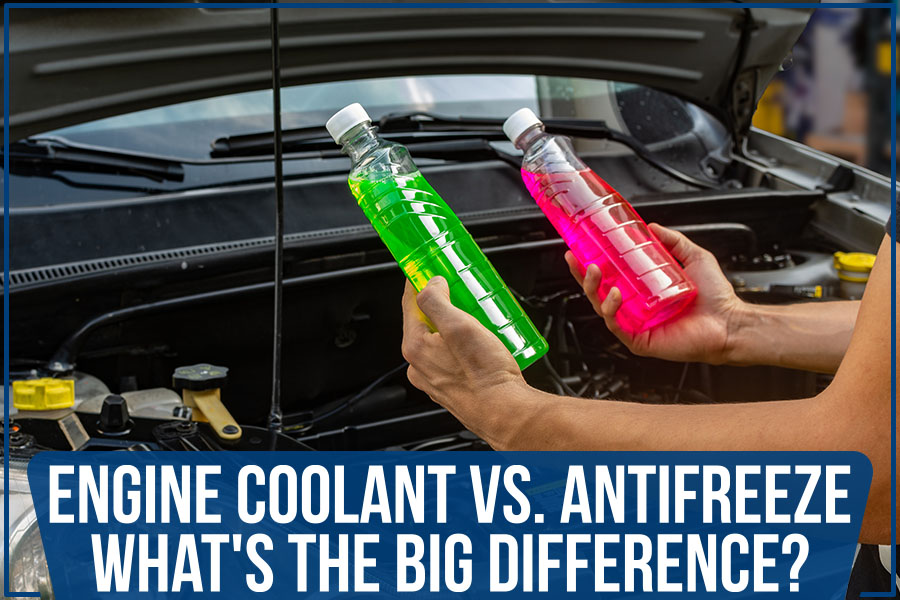
Key Takeaways:
- Antifreeze is not the same as coolant and should not be used interchangeably.
- Your engine will not overheat if you maintain radiator fluid properly.
- Antifreeze prevents your automobile’s cooling system from freezing over in the winter and helps balance the engine’s heat all year.
- Check with a local automobile dealer or mechanic to ensure that the fluid type is correct for your car, or look in the manufacturer’s handbook.
- Mike Patton CDJR offers car maintenance and repair services to customers in Pine Mountain, GA, and the surrounding areas.
Regular maintenance is critical to keeping your engine cool. That is why automobile owners should know the differences between coolant and antifreeze. Coolant aids in the prevention of engine overheating, whereas antifreeze prevents your car from freezing in cold temperatures. Mike Patton CDJR will explain the distinctions between coolant and antifreeze and which kind of fluid you’ll need for your vehicle.
Car’s Cooling System
The cooling system maintains the engine’s temperature at a constant level. The radiator fluid, coolant, or antifreeze, is used to remove heat from the engine and distribute it throughout the vehicle. The liquid then travels back to the machine, absorbing additional heat and repeating the process.
What Is Coolant?
The coolant is composed of water and ethylene glycol, with chemical additions to keep the engine from overheating by circulating through the radiator.
What Is Antifreeze?
Antifreeze is a coolant that includes an additive to prevent it from freezing in cold weather and raise the boiling point to stop it from overheating in hot weather. Most antifreeze contains either ethylene glycol or propylene glycol.
Which Radiator Fluid Should You Choose?
The difference between coolant and antifreeze is critical since using the incorrect fluid in your automobile can result in severe damage. If you are in a hot environment, you will require coolant for your car. Coolant aids in heat dissipation from your engine and protects the metal components against corrosion. In cold weather, your vehicle will require antifreeze. Antifreeze prevents your car’s engine from freezing during cold conditions and helps to keep it cool in hot weather.
To determine which fluid works best for your car, speak with a car dealership or a qualified mechanic. They can help you determine which type of fluid is better for both your vehicle and the climate where you live.
How Does Radiator Fluid Work?
– Over time, the water and glycol solution in the coolant evaporates due to heat from the engine. As a consequence, the glycol is left behind, preventing corrosion.
– Antifreeze is a substance that, when mixed with water, lowers the liquid’s freezing point. Adding antifreeze to your car’s radiator ensures that the mixture won’t freeze and damage your engine, even on cold days.
Types of Coolant
There are three types of coolants if classified by technology:
1. Inorganic Acid Technology Coolant (IAT)
Inorganic coolant, while having a longer service life than organic coolants, doesn’t protect metal surfaces from corrosion as long.
2. Organic Acid Technology Coolant (OAT)
Unlike their inorganic counterparts, organic car coolants offer enhanced protection against metal surfaces and improved heat transfer capabilities. They must be changed more frequently than inorganic automobile fluids since they begin to build up on engine components after a while. An OAT coolant is now used in several new vehicles.
3. Hybrid Organic Acid Technology Coolant (HOAT)
HOAT is the best car coolant as it provides the benefits of both organic and inorganic fluids. It is long-lasting and offers superior protection against corrosion.
How to Choose the Right Coolant?
Depending on your car, the type of coolant you require varies. Some suggest that a 50/50 mixture of water and antifreeze should be used year-round for all models, as it helps prevent freezing and overheating. Whichever climate you live in, we recommend following the guidelines from the car’s manufacturer. The manufacturer’s instructions should provide all the information you need. You can also check with your local car dealership to see what car coolant is ideal for your vehicle. It’s also critical to use the correct proportion of water and coolant. The ratio differs based on the type of coolant you’re using.
How to Check If Your Car Needs A Coolant Or Antifreeze Flush/Change?
Flushing or changing your car’s coolant/antifreeze is simple if you know the signs that it needs to be done. For example, one way to tell is by checking the fluid’s color – if it’s brown or rusty, it needs to be changed. Another method of telling is examining the fluid level. If the level indicator shows low, more antifreeze must be added. Finally, the odor of the liquid may also provide valuable insight. If it smells sweet, this indicates that too much sugar (one of the basic components) has been deposited in your radiator, clogging its pipes. You’ll need to clean and flush your radiator.
Also, read our blog about engine overheating symptoms so you can prevent them from occurring.
What Happens If I Use Coolant and Antifreeze Interchangeably?
Is it okay to put coolant in my automobile if I need antifreeze? The answer is no. If the outside temperature is below 32 degrees Fahrenheit, using coolant instead of antifreeze can severely harm the engine. Check your owner’s handbook or talk to a specialist at the car dealership to determine which type of fluid your car needs.
Use Coolant and Antifreeze Responsibly
You must use the proper fluid type in your automobile now that you know the difference between coolant and antifreeze. Check your owner’s manual for precise instructions about the sort of fluid to use. If you’re unsure, consult with someone who knows what they are talking about; it isn’t complicated.
Dispose of any fluids you don’t plan on using so they can’t unintentionally hurt our planet. Help the environment by recycling containers that can be used repeatedly.
Keep your car running smoothly by regularly checking the coolant level and adding more as needed. Insufficient coolant levels can overheat the engine and cause severe damage.
If you’re unsure which coolant to use, how to check the level, or how often it needs topping up, ask the experts at your local car dealership next time you’re in for a service.
Need Car Maintenance and Repair Services in Pine Mountain, GA? No Problem!
We at Mike Patton CDJR want to ensure that your automobile is well cared for, even when it comes to the little things like maintaining or refilling car fluids. So please stop by our Pine Mountain, GA, car dealership before filling up your radiator fluid with whatever you have on hand so we can take a look. We’ll refill the compatible coolant or antifreeze for your automobile and assist you in staying stress-free on the road.
Schedule services now while you’re here, and look at our new collection and used vehicle inventory!
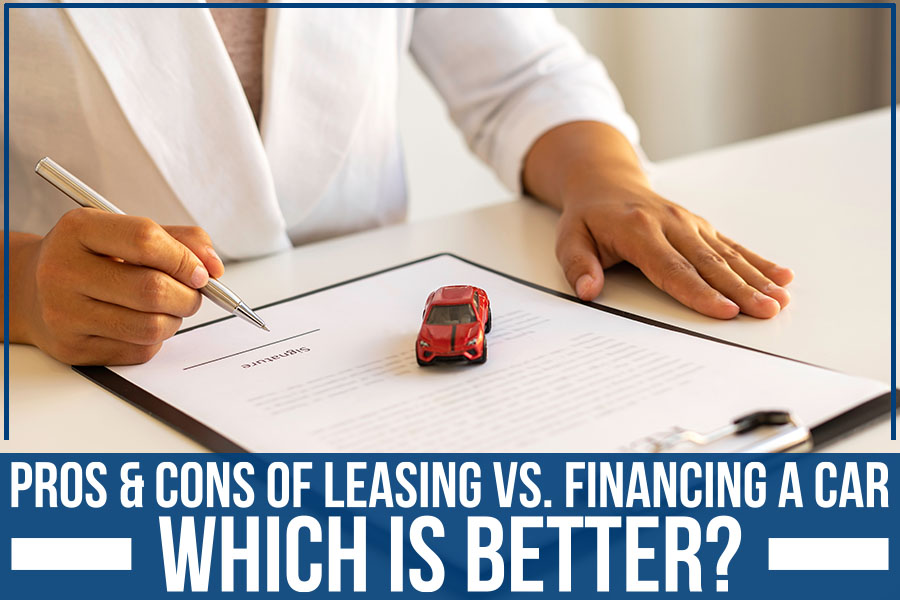
Key Takeaways:
- Financing and leasing are two of the most popular options when it comes to car ownership;
- With financing, you can enjoy the long-term right and the ability to sell or trade-in your car later;
- Leasing allows you the joy of driving a new car every year and can be more affordable than financing;
- Weigh your options between leasing and financing before deciding;
When purchasing a vehicle, you have a few different options. You can pay cash and buy the vehicle outright, get financing through a dealership or lender, or go with the prospect of leasing. Each option has its pros and cons that you should know about before making your decision.
If you’re wondering whether leasing or financing is better for you, there are some things to consider before your make the final purchase. However, let’s begin with understanding what they mean.
Financing A Car
When we use the term “financing” a car, we refer to the option that enables you to have ownership of a vehicle. Lenders like banks, car dealerships, and car manufacturers offer loans to help you purchase your new car. Let’s look at some advantages this method provides.
Advantages of Financing Your Car
Total Ownership
The idea of owning your car is an attractive proposition. After all, it is a vehicle you will likely use daily, so why not own it outright? When you finance your car, you will eventually own it free and clear. You can sell it, furnish it, or even put a custom paint job on it without violating the terms of your lease.
Possible Tax Deductions
Previously, financing a car allowed you to deduct the interest you paid on your loan as an itemized deduction. In some states, you may still be able to reduce the interest on your car loan if you use the vehicle for a specific purpose, such as business.
Builds Credit
You can improve your credit score by buying a car loan and maintaining your payments. By establishing a good payment history, you can qualify for better financing terms in the future.
No Restrictions
Now that you are technically purchasing your car through cash or loan, you will not have to deal with any restrictions when you lease a vehicle. There’s no limit on the mileage, and you are free to modify your vehicle however you want. The advantage of selling the car whenever you want is another added perk.
Disadvantages of Financing Your Car
Higher Overall Cost
Financing a vehicle costs more than leasing the same car. Financing charges can add 20% to the total cost of your automobile.
Unfair Trade-ins
When it is time to get a new car, you may be offered an unfair trade-in value (unless you negotiate well) because you are now an “upside down” car buyer. You still owe money on the loan, but the car may be worth less than what you owe.
Risk of Negative Equity
If your car depreciates faster than the terms of your loan, you could be “underwater” or “upside down.” These two terms imply that you owe more on the car than it is worth. Some vehicles depreciate quickly, and if you have to sell the car or get into an accident, you could be stuck paying for it for longer than you can afford.
Tied to the Vehicle
The flexibility of changing vehicles is taken away, and you find yourself driving a car you might not even like after a few years. And for reasons we have already discussed, selling the car before the end of the loan is not a smart choice.
Leasing A Car:
Due to its various pros, car leasing is becoming more popular among car owners. The method is simple and straight: you make monthly payments to a car dealership for the use of their vehicle over a said period (typically 2 to 3 years). When the contract expires, you can return the car, lease another one from the same or different dealership, or even buy the vehicle outright if you’ve fallen in love with it.
Advantages of Leasing Your Car
Extended Warranty and Hassle-Free Maintenance
The beauty of car leasing is that you can avoid many of the hassles and headaches associated with owning one. For starters, most leases come with an extended warranty that covers repairs and maintenance – meaning you’re not dealing with the troubles of unexpected bills down the line.
Lower Monthly Payments
Leasing a car tends to be a relatively cheaper option. When you lease, you’re only paying for the car’s depreciation during your lease period – rather than the total price.
No Resale Hassles
The perils of selling your car once you’re done with it are a burden off your shoulders. Once the lease is up, you can hand over the keys to your dealership and walk away.
Disadvantages of Leasing Your Car
Expensive in the Long Run
Although leasing may have lower monthly payments, it’s often more expensive in the long run. The lack of equity means you never build any value in your deal.
Restrictions on Mileage
Leasing companies often put mileage restrictions on leased vehicles. You are restricted to a certain number of miles per year (usually between 10,000 and 15,000). Going over the limit means paying a penalty fee.
No Ownership or Control
The joy of driving a new car wears off quickly when you realize that you don’t own it. You can’t make any modifications without the approval of the leasing company, either.
The Final Verdict:
Financing is more flexible than leasing, which is why we recommend it. If you’re going to use a vehicle for a short time, leasing it from the bank is the better option. Financing is a more sensible choice if you intend to keep the car for longer.
Finance Your Car in West Point, GA
At Mike Patton CDJR, serving West Point, GA, we have a wide range of financing options. We will help you resolve your credit issues to qualify for an auto loan.
By starting your vehicle financing application today, you can get pre-approved for financing and know precisely all your potential options.
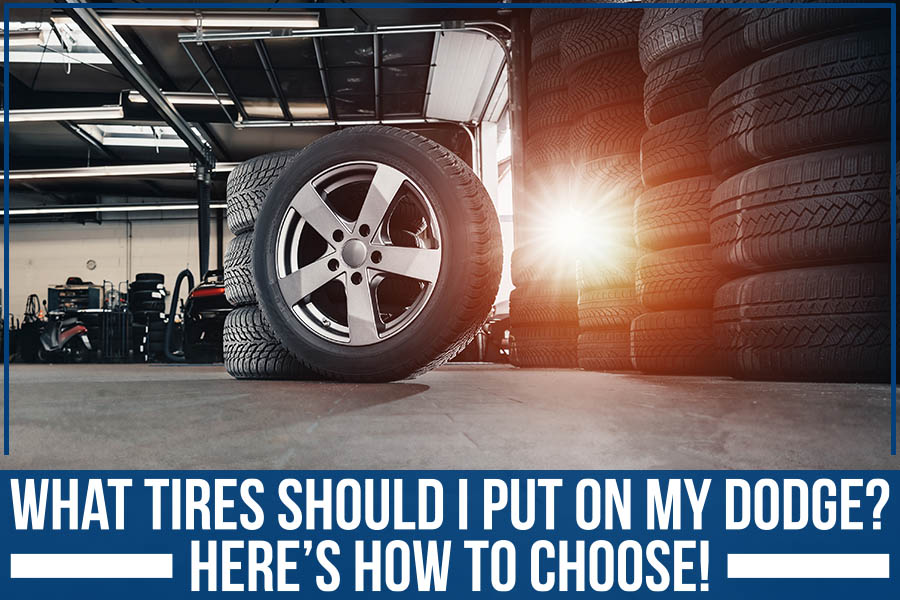
Are you in the market for some new tires for your Dodge? If so, you’re probably wondering what the best option is. After all, there are a lot of different tires out there, and it can be difficult to know which one is perfect for your car.
In this blog post, Mike Patton CDJR will walk you through choosing the right tires for your Dodge. We’ll discuss what to consider when making your decision, and we’ll give you tips on finding the perfect set of tires for your needs. So, if you’re ready to hit the tire shop, keep reading!
Choosing The Right Set Of Tires For Dodge
Alright, so we know that Dodge is synonymous with speed. But did you know that the right tires can significantly affect how your car handles? That’s why it’s important to take some time to choose the right tires for your Dodge. Here’re a few things to consider when making your decision:
- First and foremost, you must consider what kind of driving you’ll be doing. Are you mostly going to be on the highway? Or will you be hitting the back roads? Depending on your answer, you’ll want to look for tires designed for that terrain.
- You also need to consider your area’s weather conditions. If you live in a place with lots of snow, you’ll want to ensure you have tires that can handle the icy roads.
- It’s also necessary to think about your budget. Tires can range in price from a few hundred dollars to over a thousand. So, you’ll have to decide how much you will spend on tires.
- Once you have a good idea of what you need, it’s time to start shopping around. You can look it up online or visit your local tire store. Just make sure you compare prices and reviews before making your final decision.
- Finally, don’t forget to install your new tires with a professional. They can help ensure that they’re properly inflated and aligned.
Top Tire Companies
Let’s look at the most popular tire companies to decide which is best for you.
1. Michelin
Michelin is among the leading tire manufacturers in the world. They offer a wide range of tires for all vehicles, including cars, trucks, SUVs, and more. Michelin tires are highly recommended for their quality and durability.
2. Pirelli
Pirelli is another top tire company that offers a variety of tires for all types of vehicles. Pirelli tires are known for their excellent performance and handling.
3. BFGoodrich
BFGoodrich is a well-known tire company that offers a variety of off-road tires. BFGoodrich tires are designed to provide superior traction and performance in all types of terrain.
4. Continental
Continental is a leading tire manufacturer that offers a wide range of tires for all vehicles. Continental tires are known for their quality, durability, and performance.
Here’s How Mike Patton CDJR Can Help You!
Are you looking for car parts or services in Corinth, GA? Mike Patton CDJR is your one-stop shop for all your car needs! We offer an extensive range of automobile services, including tire installation and repair. Our team of experts is here to help you find the perfect set of tires for your Dodge.
Contact us today & learn more about our services!






